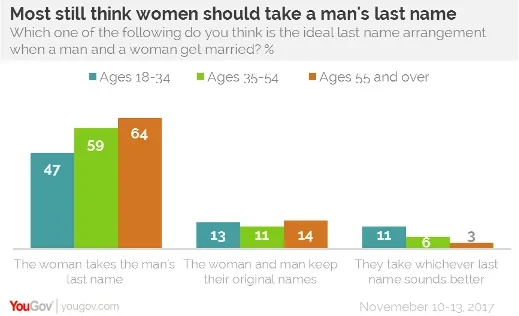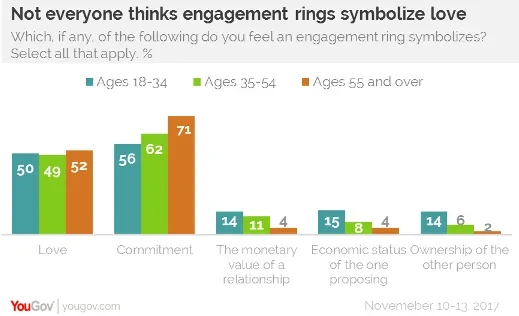And 14% of millennials think engagement rings symbolize ownership over the other person
Recent studies show that married couples with different last names are frequently judged by their peers. According to new data from YouGov Omnibus, 57% of US adults think that it is ideal for a woman to take their husband’s surname. However, while traditional conventions surrounding marriage are prevalent, they seem to be less so among younger generations. Less than half of millennials (47%) think a woman should take a man’s last name, in comparison to 59% of those 35 to 54, and 64% of individuals over the age of 55.
The majority of respondents are for the custom, but 13% would prefer men and women kept their original last names after marriage. Millennials are almost just as likely, though, to think married couples should use whichever last name sounds better – one in ten millennials feel this way (11%), while just 6% of 35 to 54 year olds and 3% of those 55 and up feel the same. Only 2% of Americans would like to see men take the last name of a woman.

While perhaps becoming more lax concerning last names, tradition still prevails when it comes to the wedding itself. The majority of US adults in all age groups believe white is the ideal color for brides to wear on their wedding day (66%). No other color option listed – colors such as pale blue, black, and rose – received more than 4% of respondent’s votes.
While the vast majority of Americans (82%) approve of the act of giving/receiving engagement rings, there seems to be divisions about what the ring itself symbolizes, especially among millennials. Most US adults see engagement rings as a sign of love (51%) and commitment (64%), but younger generations aren’t so convinced the jewelry isn’t also tied to consumerism.
For example, 15% of millennials think an engagement ring symbolizes the economic status of the one proposing – just 4% of those over the age of 55 feel the same.
Similarly, 14% of millennials think engagement rings symbolize the monetary value of the relationship. Millennials are also the most likely age group to feel that engagement rings are a way to show ownership over the other person (14%).










